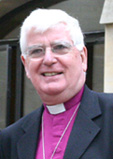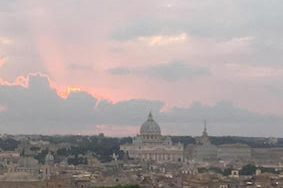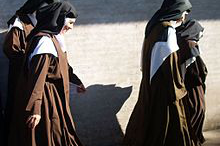Anglican Bishop speaks on property and the Apostolic Constitution

Bishop Tom Butler
The Anglican Diocese of Southwark has just published the following statement today (Thursday).
In his Presidential Address to Diocesan Synod on Saturday 7 November the Rt Rev Dr Tom Butler, The Bishop of Southwark, commented on some of the possible effects of the proposed Apostolic Constitution.
He said, '... the papal initiative of a couple of weeks ago has put the cat among the pigeons...'. He went on, 'What matters in Southwark is that we seek to maintain the excellent relationships which we have with our Roman Catholic friends at every level of church life, Diocesan, Area, Deanery and Parish.'
He continued, '...questions were being asked of my office (so) I thought it wise to seek a little legal advice on the implications there might be for the Diocese and its Parishes if any Priest, or group of lay people wished to become Roman Catholics, which of course they are perfectly entitled to do, after all there has always been movement between the denominations and in recent timesthe Diocese of Southwark has benefitted enormously from the ministry of several vicars who were formerly Roman Catholic priests.
But no priest or group of laity has the right to take church property with them when they change denominations, for a Diocese holds such property in trust for the mission and ministry of the Church of England to all the people of its parishes and this duty of care would continue.
I don't myself see how a parish could legally "take" the parish church and other assets without specific statutory authority.In the case of the parish church, it would presumably mean a Scheme under the Pastoral Measure or specific legislation enacted for the purpose, and this could only be done with the goodwill of the Diocese.In the case of assets such as the church hall or other parish property, appropriation to another denomination would almost certainly be a breach of trust and would not be possible without the co-operation of the Diocesan Board of Finance as Custodian Trustees and probably also the involvement of the Charity Commission.Parsonage houses are, of course, governed by the Parsonages Measure and an Incumbent cannot alienate the parsonage without obtaining the authority required by law, again the Diocesan Board of Finance or the Church Commissioners.Of course, in the months and years ahead much of this might well be crawled over by lawyers on all sides, but the general principles seem to be clear.....'.
The full text of the Bishop's Presidential Address to Synod follows:
Presidential Address by The Rt Rev. Dr Tom Butler, Bishop of Southwark
Bishop Tom addresses Synod May I add my welcome to you all as we meet for this first Diocesan Synod of a new triennial and may I welcome in particular new members of the synod. I hope that you’ll all soon feel at home and be prepared to make your particular contribution to our deliberations. Synod works best when there is maximum engagement of all its members.
As this is a new Synod I thought that it might be helpful to give a little attention to what we think we are about and why. Well beginning at the beginning, the Church of England sees itself as a part of the one Holy, Catholic and Apostolic Church which has its origins in the creative, redeeming and sanctifying work of the Holy Trinity. The New Testament contains a rich variety of images for this Church. Among them the Church is described as the people of God, as a holy nation, as a royal priesthood and as the Body of Christ, and of course each of these images can find expressions in different models of Church life.
Because of its rich and varied history, bloody at times, the Church of England is both catholic and reformed and at its best is a church of thoughtful holiness. It sits beneath the authority of the Bible but believes that God has words for us also in the world he has created. Our Church has been gifted with an ordained ministry but also believes that all baptised members of the Church have a responsibility for its common life and witness. Again, because of its theology and history, through Diocesan and Parish structures it takes some responsibility for the life of all the citizens of our land. All have a claim upon the attention, concern and ministry of their local church, and equally the Church of England does not apologise for its witness to and service of the wider community. It has earned the right to do both.
Of course, today the Church of England is part of the wider Anglican Communion and we have the treat in store of shortly hearing from Bishop Cleophas, Bishop of Matabeleland, one of our partner dioceses, in Zimbabwe, linked with the Kingston Episcopal Area. We are also all looking forward to the consecration of Julius Makoni as Bishop of Manicaland on November 22nd. The Diocese will be represented by three members of the Woolwich Manicaland link led by the Bishop of Woolwich. Meanwhile, the Croydon Episcopal Area continues to develop its ongoing partnership with Bishop Ishmael in Central Zimbabwe. These are critical times for the future of that country and we are determined to give every support to our church partners as they play their part in nation building.
In the wider Anglican Communion we are all well aware there are current discussions taking place globally about what might be the specific marks of Anglicanism and whether we need formally to spell them out in a Covenant. In some ways the provinces of the Anglican Communion do have considerable similarities but in others, not least in church governance each will be distinctive, and none more so than the Church of England.
With this theological and historical background a Diocesan Synod attempts to do several things. First, it brings together two sorts of authority. Bishops derive their authority from their orders and from tradition and certainly have a representative role both within and outside the church. Frequently we hear the call for Bishops to exercise leadership and such leadership at times needs to be challenging and prophetic, but if it fails to evoke a response from the whole church it is ultimately ineffective. A Diocesan Synod in part then is a forum where the leadership given by Bishops can be both tested and enabled.
But, a Synod has a wider role than this for it has its own sources of authority derived from its members being elected to represent others, and having legal duties to develop and control resources. In summary a Diocesan Synod is an opportunity for the Bishops, clergy and laity of the Diocese to meet together to take weighty council so that the mission and ministry of the Church can be both enabled and sustained throughout all the parishes, schools and agencies of the Diocese. It is an attempt to seek the mind of Christ for this local part of his Church and to reach a consensus in the ordering of the Church’s life. That’s what we’re about as we meet in St John’s Church today.
One doesn’t need to be too prophetic to predict that two weighty matters at least will occupy the mind of this synod during the next three years. Like the rest of society the Diocese will have to respond to the financial challenge of a world and nation climbing slowly and painfully out of recession. Money is spiritual and our parish share system is mission in action. It is the way in which we maintain and develop ministry in every corner of the Diocese whether comfortable or uncomfortable. We have some figures on that in our papers this morning. Then as you know we are responding to some painful financial decisions at the present time and as well as giving attention to next year’s budget we will be having a report from the Chair of the Financial Task Group on the progress which the group has made in exercising the authority which we gave it at the last meeting of the Synod.
Then Synod, although not today, will have on its agenda I’m quite sure, the progress towards the ordination of women as bishops. Nationally the legislation is with the General Synod’s Revision Committee at present and they hope to bring recommendations to the meeting of the General Synod next February, after which, if all goes well draft legislation will come to Diocesan Synods, but nothing at this stage can be taken for granted.
And of course, the Papal initiative of a couple of week’s ago has put the cat among the pigeons. As is well known the Archbishop of Canterbury was not consulted and had very little no notice of the initiative. Was this discourteous of the Vatican, of course it was, although we are also told that the Roman Catholic Bishops and Archbishops had just as little notice and so there is embarrassment all round. What matters in Southwark is that we seek to maintain the excellent relationships which we have with our Roman Catholic friends at every level of church life, diocesan, Area, deanery and parish.
The promised constitution for ex-Anglicans hasn’t yet been published and so it is a little early to speculate on its contents, but because there are some wild ideas going around leading to questions were being asked of my office I thought it wise to seek a little legal advice on the implications there might be for the Diocese and its Parishes if any Priest or group of lay people wished to become Roman Catholics, which of course they are perfectly entitled to do, after all there has always been movement between the denominations and in recent times the Diocese of Southwark has benefitted enormously from the ministry of several vicars who were formerly Roman Catholic priests.
But no Priest or group of laity has the right to take church property with them when they change denominations, for a Diocese holds such property in trust for the mission and ministry of the Church of England to all the people of its parishes and this duty of care would continue.
I don't myself see how a parish could legally "take" the parish church and other assets without specific statutory authority. In the case of the parish church, it would presumably mean a Scheme under the Pastoral Measure or specific legislation enacted for the purpose, and this could only be done with the goodwill of the diocese. In the case of assets such as the church hall or other parish property, appropriation to another denomination would almost certainly be a breach of trust and would not be possible without the co-operation of the Diocesan Board of Finance as Custodian Trustees and probably also the involvement of the Charity Commission. Parsonage houses are, of course, governed by the Parsonages Measure and an Incumbent cannot alienate the parsonage without obtaining the authority required by law, again the Diocesan Board of Finance or the Church Commissioners. Of course in the months and years ahead much of this might well be crawled over by lawyers on all sides, but the general principles seem to be clear and we can all relax a little whilst the plot thickens. My own feeling is that the Vatican’s initiative is more aimed at ex-Anglicans in the United States than members of the Church of England but no doubt some of our people will wish to give it serious
consideration.
This Synod then is not going to have a dull triennial and I am well aware, of course, that you will be facing these questions during a vacancy in See and then together with a new Bishop of Southwark, but we can all be confident that this is a Diocese of great strength and resilience and this is a Synod which never shirks from taking hard decisions in a spirit of collegiality. The future then is bright and for the next few months it’s business as usual.


















